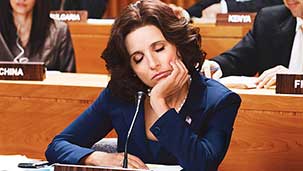Dear Aspiring Female Comedy Movie Stars,
One of the funniest moments from the 2014 Golden Globes was the bit involving hosts Tina Fey and Amy Poehler calling out Julia Louis-Dreyfus, nominated for Best Actress in a Motion Picture Musical or Comedy, for sitting in the “film section.” The camera cut to Louis-Dreyfus wearing oversized sunglasses and puffing an E-cigarette while snubbing Reese Witherspoon’s attempts to get a selfie with her. Later in the broadcast, the camera caught Louis-Dreyfus eating a hot-dog in the “TV section,” where she’d slunk back after losing her second Golden Globe of the night (for Best Actress in a Television Series Musical or Comedy).
The gag played well because the three women in on the joke are huge television stars. Huge, even by the high standards of the film world. Amy, Tina, Julia: they’re household names. They have “fuck you” money. And while they’ve all had varying degrees of success on the big screen, none of them seems particularly fussed that they haven’t achieved Jim Carrey or Eddie Murphy levels of box-office success. And why should they? They know the film/TV paradigm has shifted.
The last two decades have seen the rise of cable, satellite, and digital networks, which has lead to a steady increase in the quality of television programing. With fewer constraints and bigger budgets, networks like HBO, AMC, FX, Comedy Central, and now Netflix are creating content that rivals cinema in scale and popularity. Cable’s increase in quality scripted shows has meant that the once all-powerful Big Three networks have had to adapt to compete. The rising tide has raised all ships, and with it, the scope of comedic roles for women.
So when Christopher Redmond recently asked if a female comedian could ever be a movie star, it occurred to me that the real question is: why would she want to?
Female-driven TV comedies like Broad City, Girls, and Unbreakable Kimmy Schmidt are continuing a long tradition of female dominance in comedy television. In my childhood and teenage years, shows like The Mary Tyler Moore Show, Rhoda, Maude, Alice, Facts of Life, Laverne & Shirley, Kate & Allie, Roseanne, A Different World, Murphy Brown, Designing Women, and _The Golden Girls reigned supreme (of those twelve shows, eight of them were either created or produced by women).
In addition to those aforementioned programs, Susan Harris, Marcy Carsey, Caryn Mandabach, Diane English, and Linda Bloodworth-Thomason were also responsible for creating and producing at least 20 more hit television comedies (including Soap, 3rd Rock From The Sun, That 70s Show, and Nurse Jackie). These women paved the way for creators, writers, and showrunners like Amy Sherman-Palladino (Gilmore Girls), Jenji Kohan (Orange Is The New Black), Diablo Cody (United States of Tara), Jill Soloway (Transparent), and many more. If we throw Lena Dunham (Girls), Amy Schumer (Inside Amy Schumer), Tina Fey (30 Rock, Unbreakable Kimmy Schmidt), Mindy Kaling (The Office, The Mindy Project), and Ilana Glazer and Abbi Jacobson (Broad City) into the mix, we’re looking at the creators and stars of some of the most critically acclaimed – and popular – shows on television.
How can films compete with that?
We’ve all seen the depressing statistics of the number of women behind the camera in Hollywood, so when a female-driven comedy, written by women becomes a sleeper hit and nets huge box office, we’re supposed to be happy. But I was one of the few women that didn’t drink the Bridesmaids Kool-Aid. I just didn’t see it as the game-changer everyone kept claiming it was. It had some funny moments, sure, but nothing that really spoke to me as a woman or a comedy fan (I much preferred the deliciously cynical Bachelorette). Bridesmaids felt compromised to me. With its poop jokes and pratfalls, Kristen Wiig and Annie Mumolo’s screenplay wanted to be a woman’s movie for 14 year-old boys (because that teen boy demo is still the holy grail for the film industry, at least for comedies—what else would explain how Adam Sandler projects still get greenlit?).
With a wealth of juicy roles for women in television, it seems that the only thing left to lure you to the big screen (besides the big paycheck) is the prestige. Sure, headlining a box-office hit is a huge accomplishment. But, as the saying goes: “You’re only as good as your last film.” (Unless, once again, you’re Adam Sandler.) That’s a lot of pressure. Here’s my advice: why not just make a hit TV show where you can enjoy the challenge of building a complex and beloved character (and earn a steady income) over the course of several seasons, then, on your off time, you can take your pick of the clever and nuanced indie scripts piling up in your trailer? If you still don’t think television is distinguished enough you can build your own production company, like Mary Tyler Moore did (MTM Enterprises), and make dozens of popular TV shows (like The Bob Newhart Show, WKRP In Cincinnati and Hill Street Blues, just to name a few), and still find time to get nominated for a Best Actress Oscar (Ordinary People). Or maybe you can just run a major television studio, like universally adored comedy legend Lucille Ball did with Desilu, which produced shows like Mission Impossible and Star Trek.
Oh, and there’s one other thing the movies can’t offer: syndication.
Still not convinced? Ask Julia Louis-Dreyfus if she’d trade her four decades of steady television work on iconic shows like Saturday Night Live and Seinfeld (or her Emmys, Golden Globe, or SAG Awards) for one big comedy box office opening weekend? Better yet, ask one of the hottest and most popular comediennes working right now, Betty White.
Or you can ask Jim Carrey and Eddie Murphy. Anybody seen them lately?
See you soon,
Di




